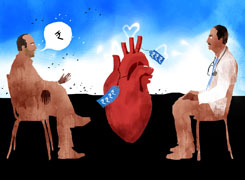Need Expert Advice?Our Gurus Can Help

Dr Shakeeb Ahmed Khan
Physiotherapist
184 Answers | 19 FollowersFollow
He has served as a technical consultant for the World Health Organisation, the United Nations, the Tata Institute of Social Sciences and several national and international NGOs.
Besides physiotherapy, he is keenly interested in disability management, early intervention, geriatric care and assisting children with disabilities.
Dr Khan has a bachelor's degree in physiotherapy from the Ravi Nair Physiotherapy College in Wardha, Maharashtra, a master's degree in disability rehabilitation administration from the National Institute for the Mentally Handicapped, Secunderabad, and a PhD in disability management from Bangalore University.... more
Answered on Dec 17, 2025

Answered on Nov 14, 2025

Answered on Nov 10, 2025

Please listen to your body's signals and consider consulting a physiotherapist for personalized guidance. I wish you quick recovery
Answered on Nov 10, 2025

Answered on Nov 10, 2025

Answered on Sep 19, 2025

Answered on Sep 09, 2025

Answered on Sep 09, 2025

Answered on Sep 09, 2025

Answered on Sep 09, 2025

Answered on Sep 09, 2025

Answered on Sep 09, 2025

Answered on Sep 09, 2025

Answered on Sep 09, 2025

It is very important to remember that your medication is there for a reason. At this stage, you should not stop or reduce it on your own, no matter how disciplined you are with your workouts and diet. The role of physiotherapy and lifestyle interventions is to complement your treatment, not replace it. Over time, as your blood pressure improves and remains stable, your doctor may consider reducing your medication, but that decision has to come from careful medical monitoring. In short, physiotherapy can absolutely play a role in helping you move toward healthier blood pressure levels, but it should work hand in hand with your medical treatment rather than being seen as a substitute. I wish you a healthy and active life.
Answered on Aug 25, 2025
Answered on Aug 04, 2025

Wishing your mother the very best in health and strength.
Answered on Aug 01, 2025

Answered on Jul 28, 2025

Answered on Jul 22, 2025

Answered on Jul 14, 2025

Thank you for reaching out.
As a physiotherapist with two years of clinical experience, you’re in a great position to explore many exciting career paths. You can continue working in private clinics or hospitals, look for opportunities in government health services, or even in public sector organizations.
If you're drawn to work that makes a social impact, the NGO sector can be very fulfilling. There are roles in community-based rehabilitation, disability inclusion, and public health programs where physiotherapists are making a real difference in people’s lives. For those interested in sports physiotherapy it ,is another great option. You can work sports teams, academies, or even at national-level events. Getting PG in sports physiotherapy can really help you stand out in this field.
And if you're thinking long-term and want to explore research or teaching, consider doing a post-graduation—whether in India or abroad depending on your interest and resources.
There’s no one right path, and the beauty of this profession is that it gives you room to grow in many directions. Keep learning, stay curious, and follow what truly excites you. Wishing you all the best in whatever you choose next.
Answered on Jul 12, 2025

Thank you for your message, and I truly appreciate your concern and dedication toward your son’s well-being and education. I would strongly recommend getting a formal assessment done by an educational psychologist or rehabilitation psychologist, or special educator. This will help identify your son’s specific needs and guide you with appropriate remedial strategies. Based on the results, you can explore individualized learning support or remedial classes that use interactive and multi-sensory teaching methods. It would also be helpful to speak with your son’s school authorities and request exam accommodations such as extra time, a quiet exam room, or a writer if required. These supports are permitted under CBSE and state education boards for students with attention-related difficulties, provided you submit the necessary documentation. Also Physical activity, mindfulness exercises, or even short walks can help him stay focused and relaxed. If you are in Mumbai Ummeed Child Development center is one of the organization, similarly in Delhi, Action for Autism can be considered. Wishing your son very best.
.
Answered on Jul 09, 2025

Answered on Jun 13, 2025

Answered on Jun 11, 2025

Answered on Jun 06, 2025

Answered on Jun 06, 2025

Answered on May 26, 2025

Answered on May 15, 2025

Answered on May 15, 2025

As a physiotherapist, I understand how challenging slip discs (L4-L5 & L5-S1) can be, especially with recurring sciatic pain. Managing this condition requires a combination of professional physiotherapy and consistent home care. Physiotherapy is crucial, it helps reduce pain without surgery, prevents recurrence by strengthening core and spinal muscles, and improves mobility for long term relief. I strongly recommend attending 10-15 physiotherapy sessions at a nearby clinic, where you’ll receive manual therapy, targeted exercises (like McKenzie extensions or Williams flexions, depending on what eases your pain), sciatic nerve glides, and postural training. These sessions will also teach you safe exercises to continue at home, such as gentle stretches and strengthening.
At home, avoid forward bending, heavy lifting, or prolonged sitting/standing, take breaks every 30 minutes. Use a lumbar support pillow while sitting and sleep in a back-friendly position (either on your side with a pillow between your knees or on your back with a pillow under your knees). Staying active with controlled movements is key, but avoid high-impact activities like jumping.
Commit to the initial physiotherapy sessions, then maintain your exercises regularly at home. Consistency is vital for recovery and preventing flare ups. Wishing you a quick recovery! Stay patient and diligent your efforts will make a difference.
Answered on May 02, 2025

Answered on Apr 26, 2025

Answered on Apr 07, 2025

Answered on Mar 26, 2025
Answered on Mar 22, 2025

Answered on Mar 22, 2025
A study by David Elek et al., titled *"The effects of soleus push-up on glucose tolerance among individuals with prediabetes ([DOI: 10.1101/2024.11.14.623602](https://doi.org/10.1101/2024.11.14.623602)), provides further insights into this mechanism. Their research highlights how engaging the soleus muscle in low-intensity contractions can play a role in managing glucose levels, particularly in individuals with prediabetes.
However, while soleus push-ups can help manage glucose levels, they should be combined with a balanced diet, regular physical activity, and proper diabetes management. If you have diabetes or blood sugar concerns, it’s best to track your glucose levels and discuss any new exercise routine with a physiotherapist or healthcare provider to ensure it fits your overall health plan.
Answered on Mar 22, 2025
Answered on Mar 22, 2025

Answered on Mar 22, 2025
Answered on Mar 22, 2025

Answered on Mar 22, 2025

Answered on Mar 22, 2025
Answered on Feb 27, 2025
Answered on Feb 27, 2025
Thank you for your query. I would advise you not to self-diagnose and visit the nearest physiotherapist for a proper assessment, as several conditions can mimic tennis elbow. A physiotherapist will take your history, evaluate your symptoms, and provide an accurate diagnosis. If it is indeed tennis elbow, physiotherapy treatments like ultrasound therapy, soft tissue release, and stretching exercises can help reduce pain and promote healing. Strengthening the wrist extensor muscles through controlled resistance exercises is crucial for long-term recovery. Additionally, avoiding repetitive strain, using proper ergonomics at work, and wearing an elbow brace can prevent further aggravation. Please consult a physiotherapist for a personalized treatment plan. I wish you quick recovery.
Answered on Feb 27, 2025

Answered on Feb 19, 2025

Thank you for your query, and I appreciate you reaching out. Sorry to hear about your wife's condition .My response would be from Physiotherapy perspective as Physiotherapy is evidence based and well research and widely accepted management for ensuring person with Parkinson can perform activities of daily living independently and mention few exercises She can practice finger tapping, hand squeezing, wrist rotations, and palm open-close exercises to enhance dexterity. Stretching, shoulder rolls, and posture correction will help reduce stiffness. Balance exercises like weight shifts and tandem walking can improve stability. Parkinson’s requires long-term rehabilitation, so visiting a nearby physiotherapist or arranging a home visit will ensure proper guidance and support. Early intervention is key to better management. Wishing her good health and strength.
Answered on Feb 13, 2025

Answered on Feb 04, 2025

Answered on Feb 04, 2025

Answered on Feb 04, 2025

I strongly recommend that you visit a physiotherapist for a proper assessment. They will evaluate your posture, neck mobility, and nerve involvement before designing a personalized treatment plan. Physiotherapy may include postural correction, neck-strengthening exercises, manual therapy, and nerve mobilization techniques to relieve symptoms and improve function.
In the meantime, you can try neck stretches, apply heat or ice, and maintain proper posture while working or using mobile devices. However, do not ignore persistent symptoms, as timely physiotherapy can prevent worsening of the condition. Please visit a specialist soon for the best guidance and treatment
Answered on Feb 04, 2025

Meanwhile, you can try gentle strengthening and stretching exercises, maintain a healthy weight to reduce stress on the knee, and apply ice or heat for pain relief. Avoid excessive strain and ensure proper footwear to support your joints. A physiotherapist will provide you with the best guidance to help you recover effectively. I wish you quick recovery




